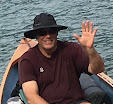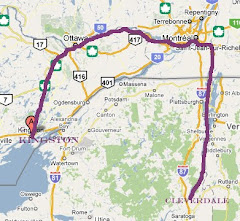 |
Each day during the row there arrived a particular moment when we had to consider where we were going to pull up for the night. Sometimes that moment occurred over our morning coffee when we would peruse the map, assess our own stores of energy and provisions, and decide on a worthy destination. These decisions were easy when rowing the canals; the locks themselves suggested logical legs, and the protected waters enabled us to plan ahead without having to react to winds or waves.
More often, however, the decision of where and when to end the day was made on the fly as weather or fatigue weighed in, sometimes overriding our boyish enthusiasm to continue. With but twenty miles under our keels on the early afternoon of June 28,for example, we were getting hammered by a building crosswind on a broad stretch of the Ottawa River. We’d put together a string of 32 mile days and at that moment, twenty miles seemed a short effort. But we looked across the choppy water at one another, surveyed the distant shores, and spotted a lone steeple on the horizon perhaps three miles distant. Over the strong gusts Brian declared, “Let’s head to the church.” Gentle Reader, believe me when I tell you that when a Rooney declares that he or she would like to head to a church, a moment of import has arrived. And it was the right call. The weather built quickly, two thunderstorms soon rolled through, and rejuvenating cheeseburgers were captured only one mile inland. Any mention of St. Placide, to me, will forever bring a sigh, a smile…and a confirmation of the occasional power of intuitive, spontaneous decision making.
But as I sit here on the back patio in Baltimore
So we’ll end it now, unless Brian adds yet one more erudite nugget before Kathy gets to the business of building the book. I hope that he will because he says in a paragraph what I say in a page, and a tight paragraph is always better than a padded page. I know this to be true. I teach 8th grade English.
In closing, though, I’d like to share some final pictures with you…images that never reached the lens of any camera but will, for me, forever define the joy of this adventure.
First, here’s a picture of Brian- I have hundreds of mental pictures of Brian – this one of his cedar boat bathed in the golden light of late afternoon on Lake Champlain, the bow parting a feather of silver water with each stroke as he pulls strongly under the deep green backdrop of the Adirondacks . It’s a perfect picture.
Oh! Here’s another picture of Brian sitting at the picnic table we’d camped next to at Brewer Lock on our first morning together. He’s heating coffee water on the little Pocket Rocket burner. It was at this moment that I knew each morning would be sublime. This too is a perfect picture, but in a different way.
Ah…look at the way the joggers and roller-bladers on shore seem to be stationary figures as we row with them through downtown Ottawa
Here’s one of many similar images: we’re locking down on the Rideau and Brian, gently holding the guide rope on the far wall of the lock, has fully reclined in his boat, his Tilley hat rakishly drawn over his eyes, taking advantage of a few minutes of respite until we’ll be rowing again. Is he napping? It’s a picture of casual competence if ever there was one.
Woah! Now here’s a dramatic photo! A fierce squall has just hit us just north of Montreal
Oh! Here are Peg and Kathy, Support Team Extraordinaire, who have appeared from out of nowhere on a dock along the bank of the loathed Richelieu River Row , Canada
This shot’s not especially clear; it’s dark at almost 10:00PM on July 7th, the night before our finish, and we’ve just arrived at Ticonderoga after rowing 48 miles in 14 hours. That’s Brian down on all fours on a dock eating a gourmet hamburger. It’s a “Hasselhoff” moment, I’m told. He was tired, but he was not too tired to chew.
Be advised: this image could be PG-13. In the low light of evening I’m lying in my tent, examining its fabric ceiling. I’ve just finished tracking down and eliminating each and every mosquito that could plague my sleep. See all of those red streaks? The mosquitoes have been dispatched, but not before they’ve had their fill first.
This penultimate mental picture is my view of my own boat while rowing. At the bottom of the picture you see my weathered feet braced against the foot-block which itself is buffered by rags to reduce blistering. The oar handles are left and right. That smooth cherry wood has propelled me through almost two thousand miles of water over the last few years. The Igloo cooler you see on the wicker stern seat carries the remnants of the day’s provisions, and the short cedar deck beyond frames the small wake I leave behind as I row. I like this picture because while the foreground images are constant, the water, hues, and horizon change from minute to minute.
Brian, this final picture is of you. It’s a face shot one morning after you’d let that beard start to come in…a bit silver, a bit sun-touched, a very salty look indeed. The eyes carry that observant light which animates your every waking moment, and you suppress a hint of the smile that I treasure when it breaks through. But I like this picture most because of what it reminds me about unconditional friendship, the kind that requires no effort and calls for a lot of care. In this picture I see the roust-about, irreverent, energetic, lovable kid I grew up with echoed in the remarkable man I so admire and love today, and I am reminded of what a treasure it has been to spend eighteen uninterrupted days with you. I think that I like this picture most of all.
Thanks, Brian. I love ya, man. And Bob, I still love you, too.
So much for the final pictures… but I’m not finished with the thanks.
Thanks to those of you who contributed money to the fundraising effort; we raised more than $7,000 for Boys’ Latin and, in a belated effort, almost $4,000 for Loomis Chaffee. Our students and their parents thank you…and the kids’ teachers thank you, too.
Thanks to Peg and Kathy for their untiring efforts to get us through when chips were down.
Thanks to Cecile, Emma, and Katherine for sharing their dad for a few weeks.
Thanks to Matt “McGuyver” Freihofer for taking a huge day off -and for a very full day of problem solving - to get us safely on the water.
Thanks, Mom, for the boat and the genes. Even though I had no say in the matter, I’d pick you.
Finally, thanks again to Mo of Rockland. Mo, that was a big one.
Ending now, for now.
Love,
Mr. Frei




























